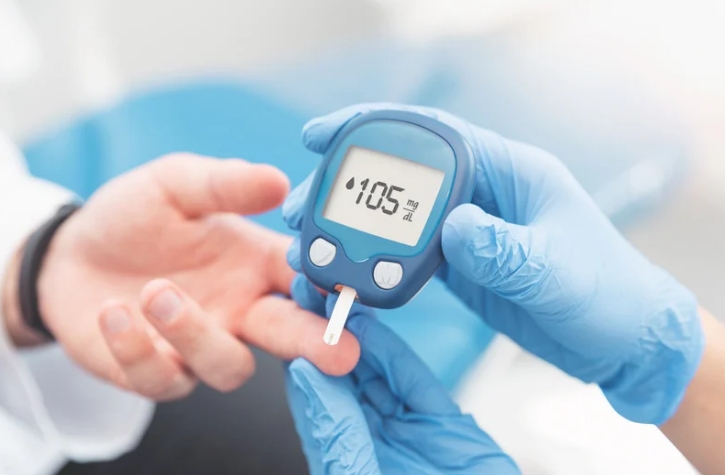
It's time. Maybe you want to get fit or manage a chronic disease. Or maybe you want to play with your grandkids without losing your breath. Regardless of the reason, you've decided to start a weight-loss journey. Dropping extra pounds can totally transform your health, but before you dust off those old sneakers and hit the pavement, it's a smart idea to meet with your primary care doctor.
Specifically, you should ask them questions about weight loss and what it means for you. Your physician, after all, is familiar with your medical history, which means they can offer guidance according to your personal health, which will only work in your favor.
"Physicians can guide the process," explains Dr. Kerri Best, M.D., a primary care physician in Toronto, Ontario. "Not all physicians are well-versed in nutrition [or weight loss], but they can point you in the direction of credible resources and practitioners."
Besides, weight loss is a highly personalized process, and there's more to consider than what's hot on the internet. "Social media is rife with confusing information regarding nutrition and weight-loss strategies," warns Dr. Best. "These approaches are not one-size-fits-all."
That's why it's crucial to touch base with your doctor. When you create the opportunity for communication, you can understand how weight loss may look for you—and only you.
If you're not sure where to start, let these 11 questions guide the first conversation with your doctor. Don't be afraid to chat about other special concerns, too. The more you understand about your own health, the more likely you are to succeed.
1. Should I lose weight?
In a sea of fad diets and "
"Ask your doctor if they feel weight loss would benefit you," Dr. Best suggests. "They can measure your BMI and waist circumference to predict your risk [for chronic disease] and decide if weight loss would be healthy for you."
Dr. Best adds that, in some situations, weight loss wouldn't even be a recommended goal. For example, people with a history of eating disorder or those who have osteoporosis shouldn't focus on losing weight. Instead, building muscle through physical activity would be more beneficial.
2. How would weight loss help me?
If your doctor thinks you're an ideal candidate for weight loss, ask them how it can benefit your health and, ultimately, your future self.
This isn't about how losing extra weight will help you fit into those old jeans. Rather, it's about learning how it can improve your
Essentially, the benefits of weight loss won't be the same for each person. When you understand how weight loss can medically improve your health, you'll be able to focus more on your wellness and less on the number.
3. How much weight should I lose?
By now, you probably have an idea of how much you want to lose. However, it's important to recognize that there is a difference between want and need, especially when it involves your body's unique physiological makeup.
Ask your doctor, "What's my ideal weight goal? How many pounds should I lose to see benefits?"
While one might say that this contradicts the notion of placing less focus on a number, the point is that everyone's "healthy weight" is different. There isn't a magic number, and there certainly isn't a one-size-fits-all answer.
"Every person has a unique set of circumstances, [including] lifestyle, genetics, injury history, [and] medications," says Dr. Bryan M. Lowery, M.D., of Frisco Concierge Medicine in Texas. There are also factors like age, chronic disease and history of being overweight or obese. Your doctor is aware of all these factors and how they affect each other. In turn, they can provide personalized recommendations based on your unique needs.
4. Do I have any medical conditions that affect my weight?
Hopefully, your doctor has already explained the link between any health problems and weight. But if you don't understand a certain aspect, don't hesitate to ask.
"Your current medical conditions can hinder weight loss," explains Dr. Lowery. "Or, [it can] even cause weight gain." For example, hypothyroidism can decrease your metabolism, making it harder to lose weight. On the other hand, polycystic ovary syndrome may cause unexplained weight gain and cravings for refined
According to Dr. Lowery, you should also ask if there's any blood work that can reveal underlying contributors to your weight gain. It's a simple yet significant question that will shed light on your overall health.
5. Am I taking medications that affect weight loss?
While everyone responds to medication differently, it's wise to discuss how your prescription drugs may influence your weight-loss journey.
This might involve the changes in your physical activity. For instance, Dr. Best shares that people who have diabetes and are taking insulin should carefully monitor their blood glucose when increasing exercise. "One should ask about particular precautions and low blood sugar prevention," she adds.
In other cases, certain prescription drugs (like antidepressants and steroids) can impact your progress. Some medications are associated with weight gain, whether it's due to the drug itself or side effects like increased appetite or slow metabolism.
It can work the other way around, too. "Weight loss might affect medication dosing, particularly diabetes or cardiovascular medications," explains Dr. Best. Your specialists might want to monitor you for specific changes, like blood sugar or blood pressure.
Regardless, it's essential to follow your doctor's guidance. Depending on your situation, your doctor might be able to change your prescription or dose.
6. Would a medical weight-loss treatment be appropriate for me?
If you've thought about a medical weight-loss treatment, ask your doctor if you're an ideal candidate. Ask about your options, too. "A licensed physician can explain the benefits and risks of these options, including what approach is appropriate for you," explains Dr. Lowery. Remember, from
Take weight-loss drugs, for example. Typically, they're prescribed to people who have a BMI of 30 or higher, or who have a BMI of 27 or higher and have weight-related conditions, like Type 2 diabetes. Plus, in most cases, your doctor might want to try controlling medical conditions and implementing lifestyle changes first.
7. Is it healthy for me to diet?
This question might surprise you. Much like weight loss, dieting is often seen as a synonym for "health." However, that doesn't mean everyone is in a place to adopt a new eating routine.
"There are many eating strategies," explains Dr. Best. "Each option has benefits and consequences and are suited to particular needs.
Moreover, many of today's most popular diets don't consider your current health status and relationship with food, two major factors of positive dietary change. Ask your doctor to recommend the best first step for you. From there, they can point you to a nutritionist or dietitian who can provide more personalized guidance.
8. What exercise should I start with?
With the popularity of CrossFit, indoor cycling and HIIT, it's easy to feel like high-intensity exercise is the best way to be fit. Yet, your body might not be in a place to jump right in. This is especially true if you're new to exercise or haven't worked out in a long time.
Ask your doctor for their advice on starting an exercise routine. They can recommend different activities based on your current health status and fitness level. As the conversation develops, consider asking
- How can I gradually increase my level of activity?
- Can you provide examples of specific activities and duration?
- Do I have any restrictions in terms of types of movement or intensity of exercise?
- How do I know if I'm working hard enough or too hard?
- What red flags (like injuries) should I consider when increasing physical activity?
9. What else can I do to lose weight?
While diet and exercise are at the forefront of weight loss, you should also talk to your doctor about other lifestyle habits. For instance, your sleep can impact your weight-loss journey. According to a 2015 article in Sleep Science, lack of sleep can slow your metabolism and increase inflammation. It can also reduce
The same article shares that stress has similar effects. When you're stressed, your body makes more cortisol, the stress hormone. This can increase your appetite and change the way your body accumulates fat cells.
Sleep and stress are just two examples, but when you ask your doctor about other lifestyle habits, they can determine where you need an extra hand. This might include visiting a specialist, like a sleep doctor for sleep issues or a therapist for stress.
10. How often should I follow up with you?
This question will help you get on the same page as your doctor. It also ensures that you'll have adequate support and guidance throughout your journey to weight loss.
"[Your doctor] will want to see you regularly through your weight-loss journey to encourage you and monitor your medication needs," Dr. Best explains. This is especially important if you have medical conditions or old injuries that may pose issues along the way.
"Stay in communication with your doctor," encourages Dr. Lowery. "Be compliant—take your medications, return for
11. Should I talk to any other specialists?
Your primary care physician is your first point of contact. So, be sure to ask them if you should see other specialists. They'll be able to explain why you should see these providers and how it can affect your efforts.
For instance, if you have physical activity restrictions, Dr.
It's generally recommended that you inform all your providers about weight-loss plans; by talking to your primary care doctor from the get-go, they can nudge you in the right direction.
Hopefully, your doctor has already covered some of these topics in the past. But it doesn't hurt to bring them up, especially if you're new to weight loss. Asking questions













